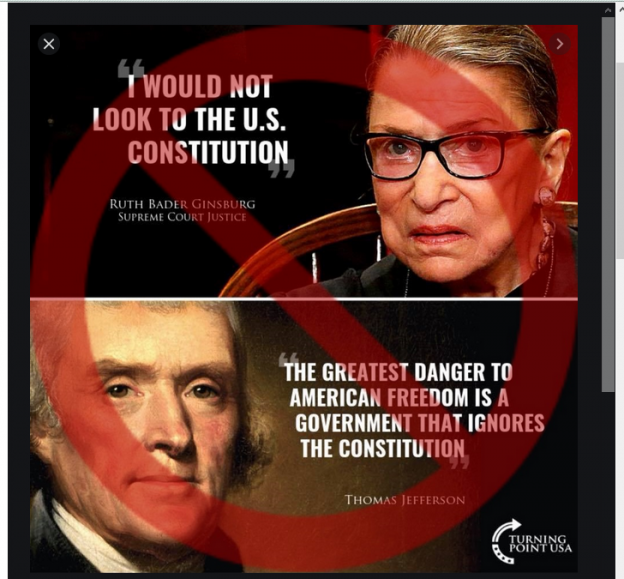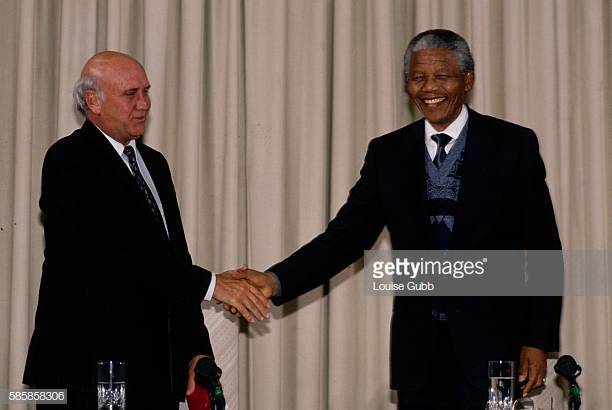Justice Ginsburg Preferred South Africa’s Constitution To The US Constitution
By Ilana Mercer, February 17, 2012:
I would not look to the US constitution,” said US Supreme Court Justice Ruth Bader Ginsburg in an interview with Al-Hayat TV. “If I were drafting a constitution in the year 2012, I might look at the constitution of South Africa, Canada … and the European Convention on Human Rights.”
Al-Hayat’s correspondent had solicited Ginsburg’s advice on drafting the Egyptian constitution.
Go easy on Ginsburg. She shares a disdain for America’s founding document with millions, maybe even a majority, of her countrymen. The US Constitution is flouted daily by the people’s representatives, and has been amended and reinterpreted to the point of no return.
The governing documents that excite Bader Ginsburg’s admiration are documents of positive rights. The American Constitution is by-and-large a charter of negative liberties, as President Obama once described it derisively.
A positive right is state-manufactured, usually at the behest of political majorities. Rights to a job, water, clothes, food, education and medical care are examples. Some of the European covenants canvassed by Bader consider “freely chosen” desirable work as a human right. Ditto adequate “rest and leisure.” Once these needs are recognized as rights, they become state-enforceable, legal claims against other, less-valued members of society (“the rich”). Someone who hasn’t had a vacation, or has not reached his career apogee, gets to collect on such claims.
In the case of natural rights—the only founding truths the nation’s fathers could have conceived of, given their classical liberal philosophical framework—the duty is merely a mitts-off duty. My right to life means you must not murder me. My right to liberty means you dare not enslave me. My right to property means you can’t take what’s mine—not 35 percent of it, or 15 percent. Nada. And you have no right to stop me from taking the necessary acquisitive action for my survival, so long as I, in turn, respect the same restrictions.
As an instantiation of a constitutional democracy governed in accordance with state-minted rights, take the new South Africa, where almost everyone knows someone who has been raped, robbed, hijacked, murdered, or all of the above, in violation of natural law.
Not that you’d know it, but the poor South Africans enjoy a constitutional right to live free of all forms of violence, “public” or “private” in origin. Section 12 of their progressive constitution guarantees the “Freedom and Security of the Person.” Clearly “progressive” doesn’t necessarily spell progress, as nowhere does this wordy but worthless document state whether South Africans may actually defend this most precious of rights. If anything, self-defense can be an offense in progressive South Africa. The law dictates that in the course of adjudicating cases of “private defense,” the right to life (the aggressor’s) and the right to property (the non-aggressor’s—whose life, by this “logic,” is not at stake) be properly balanced.
“Before you can act in self-defense,” remonstrates a representative of the indispensable South African Institute for Security Studies, “the attack against you should have commenced, or at least be imminent. For example, if the thief pulls out a firearm and aims in your direction, [only] then you would be justified in using lethal force to protect your life.”
Implicit in the right to life is the right to self-defense. A right that can’t be defended is a right in name only. Alas, in constitutional South Africa, natural rights are merely nominal.
The same document allows a good deal of mischief for the ostensible greater good. It even has a clause devoted to “Limitation of Rights.” Since some citizens are more equal than others under the law of this tormented land, redistributive “justice” in South Africa is a constitutional article of faith. It sanctions the expropriation of land from one citizen in order to give to another, in the name of “social justice.”
Knowing what you now know about the South African Constitution—what is it do you suppose Bader-Ginsburg dislikes about one of the greatest documents of political philosophy?
From all accounts, it is that the US Constitution is principally a charter of negative liberties. Arrived at through reason (or revelation), natural (or negative) liberties are the only authentic rights to which man can lay claim. LIFE, LIBERTY, AND PROPERTY: These are the sole rights of man. Congress doesn’t grant them; they exist irrespective of it.
One’s life, liberty and the products of one’s labor were not meant to be up for grabs by greedy majorities. Rights always give rise to binding obligations. There are no free contraceptives, Mr. Obama. If a woman has the right to contraceptives, someone has to work to supply her with this “right.” If one is constitutionally entitled to an education, somewhere, some poor sod will be roped into funding this manufactured entitlement.
More fundamentally, if in exercising a “right” one transgresses against another’s life, liberty and property—then the exercised right is no right, but a violation thereof. Because my right to acquire property doesn’t diminish your right to do the same, the right of private property constitutes a negative right. Negative rights are real (or natural) liberties, as they don’t conscript or enslave me in the fulfillment of your needs and desires, and vice versa.
Unless undertaken voluntarily, state-manufactured rights violate the individual’s real rights. Positive liberties—as trumpeted by Bader, Obama, and practically the whole DC Sodom and Gomorrah—are rejected outright in the natural law, followed by the Founders.
Now, the occupants of the Bench who compiled the South African, Canadian and European documents would argue that making some—”the rich” in the West, whites in a black-dominated democracy—supply others with work, water, clothes, contraceptives, food, education and medical care will increase overall liberty in society.
THAT WON’T WASH. Liberty is not an aggregate social project. Every individual has rights. And rights give rise to obligations between all decent men, including those in power. That men band in a collective called “government” doesn’t give them license to violate individual rights.
Rights, as our Founding Fathers conceived of them, are not claims to economic goods, but freedoms to act in the procurement of these goods. From the fact that most Americans, Egyptians or Russians want others to fund or subsidize their lives, it does not follow that they have such a right.
The Constitution Ginsburg, Obama and the DC Sodom and Gomorrah trash each and every day was designed to minimize political overreach, not mandate heaven on earth.
Justice Ginsburg Preferred South Africa’s Constitution To The US Constitution
©2012 ILANA MERCER
WND & RT
February 17




